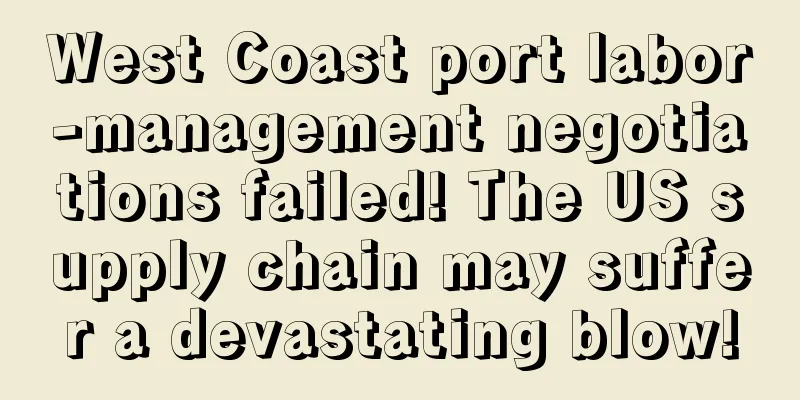West Coast port labor-management negotiations failed! The US supply chain may suffer a devastating blow!

|
It is learned that according to foreign media reports, the contract between the International Warehouse and Longshoremen's Union (ILWU) and the Pacific Maritime Association (PMA), an employer of ports on the west coast of the United States, will expire on July 1. However, negotiations are still ongoing. Experts believe that the two sides are likely to fail to reach an agreement before July 1, and this result will have a huge impact on the US supply chain and retailers. Impact on the supply chain this summer and peak season The report said that a complete port shutdown is the worst outcome, and both sides are currently working to avoid this. However, if the negotiations are not completed in time, the flow of goods through West Coast ports will slow down and most products will face transportation delays. In addition, similar to last year, retailers this year have also begun to encourage holiday shoppers to buy goods early. The reason is that with the lifting of the blockade in Shanghai, China, there will be a surge in goods arriving at US ports, and the ports may face congestion. If the negotiations are not completed in time and workers go on strike, the efficiency of the ports will be greatly reduced. Spencer Shute, senior consultant at Proxima, a procurement and supply chain consulting firm under U.S. management consulting firm Bain, said: "A complete port shutdown will be a devastating blow to the U.S. supply chain, and all retailers and consumers will feel it." Impact on businesses that rely on ports to transport goods Undoubtedly, the main impact is the delay in the transportation of goods, which affects the purchasing power of consumers. In addition, the slowdown in the flow of goods will seriously affect the marketing strategies of retailers and expose them to higher freight costs. It is learned that the breakdown of labor-management negotiations at US West Coast ports in 2015, which led to serious disruptions in port operations, is still fresh in people's minds. Out of caution, some shippers who used to rely on trans-Pacific routes have begun to reroute their cargo to ports on the US Atlantic and Gulf coasts. This is because labor-management negotiations at US West Coast ports broke down in 2015. Editor ✎ Nicole/ Disclaimer: This article is copyrighted and may not be reproduced without permission. |
>>: Seize the $1.05 trillion U.S. e-commerce market! You must know these trends
Recommend
What is the Hague Agreement Concerning the International Deposit of Industrial Designs? Review of the Hague Agreement Concerning the International Deposit of Industrial Designs
The Hague Agreement concerning the International D...
500 inventory cap! Just now, Amazon issued a new rule
The day before yesterday (December 10 ), sellers ...
What is AmzBoost.com? AmzBoost.com Review
AmzBoost.com is a US website dedicated to serving ...
What is Expedia? Expedia Review
Expedia is a famous American travel website and th...
What is Amazon Single Sign-On SSO? Amazon Single Sign-On SSO Review
Amazon recently launched a new feature, Amazon sin...
What is ETA? ETA Review
ETA is the abbreviation of Estimated Time of Arriv...
What is Reindeer Crossing? Reindeer Crossing Review
Company Profile: Reindeer Cross-border Business Se...
The keyword advertising method surpasses 90% of people, and some people use it to sell 100 million copies a year!
More than 20 days after Amazon restricted non-esse...
Amazon Off-site Marketing: Which Marketing Channel is Better, Messenger or Email?
As an Amazon seller, no one knows better than you ...
What is 9610 export mode? 9610 export mode review
The 9610 export model is commonly known as the col...
What is Amazon Merchant Manager? Amazon Merchant Manager Review
Amazon Business Manager is a professional position...
Rumors debunked! Sellers can still ship as normal, air and sea freight will not be affected
Affected by the epidemic, Amazon sellers were mos...
Amazon’s internal logic for capturing reviews
The full text has 1959 words and takes 10 minutes...
21 Things Amazon Sellers Must Do Every Day with Detailed Operation Procedures
1. Emails are guaranteed to be replied within 24 ...
What is hisenhome? Hisenhome Review
Hisenhome was founded in June 2014 and is dedicate...









